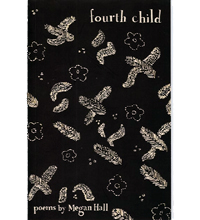|
Poetry is most valuable when it is ‘honest’. It communicates
most when it springs from deep-felt emotions, however prosaic
or personal. For this reason, a poem about the commonplace may
well succeed where one about the great issues of life fail.
The poems in Cape Town poet, Megan Hall's poetry collection,
Fourth Child, are intensely personal,
preoccupied with the twin themes of leaving and loving.
The poems on leaving are almost always about
a death – sometimes violent, as in the maternal suicide
that is the subject of the poet in Gunshot. In this sense,
the slim volume (55 pages / 30 poems) pulsates with pain, and
the poet returns again and again to this scene in Suicide
Notes, Seed,
and – most emphatically in the title poem, Fourth
Child.
April is the cruellest
month. I should never call the month my mother left ‘kind’
The honesty of these poems have a certain
translucence. The volume carries something of an autobiographical
charge, with poems that are mostly in the first person. The emotions
of bereavement are served up here, from different viewpoints.
Many lines here are linear, unlike the more three-dimensional
poem, Real, they stray into journalese,
but are no less poignant for that. Suicide Notes,
for instance, is inspired by a New Yorker article that breaks
all suicides into 5 basic varieties. The poet concludes
I am the property to be disposed of in
your note;
it may have been the first time you owned me in this way,
then immediately bequeathed, handed me over,
intact, to the next generation.
These are acutely observed pieces and the poet’s
observation particularly comes to life in Kiss:
I bring all of myself to this kiss
on the back of your neck
as you work
…
and you nod,
continuing your own thoughts.
It is mostly in these poems on love that
the poet’s lyrical voice comes into its own. – Although
the pain of death is never far away. Indeed sometimes the imagery
of death obtrudes, jarringly, as when in the midst of the exquisite
sensuousness of the lines of Your Red and Secret Lips,
the finger of death appears:
‘Lips that I’ve taken and
tasted like sushi,
or a dead man’s finger,
…
lips that I’ve rolled
between mine
like a stone rolled in water
‘,
making for one dead line in an otherwise great
poem. There are no such lines in 14,
whose words seemed writ for speaking,
‘I’ve seen the pictures on
the screen,
rolled the knowledge over
like a pebble on my tongue.’
The rest of the lines of the conception poem
rolls off the tongue just as assuredly.
From the self-absorbed (Face
considers the poet’s mirror image in a tongue-in-cheek,
‘you never know/ which parts of you incline to treachery,
which will raise/ the flag of their own republic’)
to the cynical (Meeting at Night: two
lovers sharing a bed with little heat. ‘You are still
inside me…/ We get older stained by the meetings and leavings
of other bodies’) one of the accomplished poems in
the collection blends the two themes of death and love. Seams
is dedicated to a grandmother.
Her love is in the seams, the length
of lace.
the afternoons spent being patient
…
her love is in the dresses I’ve
outgrown but can’t toss out.’
This fusion combines with the wicked humour
of You Move Fast and To
a Friend on Getting Older, to season a collection
of honest poems anatomising a grief. 
|
|
|











![]()
![]()

